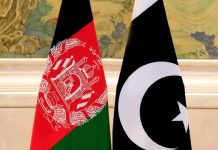Beirut (AP) – Syrian President Bashar Assad has found a valuable bargaining chip in the form of a small white pill, Captagon, which has enabled him to garner support from neighboring Arab countries. These nations are hopeful that by reconciling with Assad, he will be able to curb the widespread smuggling of highly addictive Captagon amphetamines originating from Syria.
Western governments have expressed frustration at the warm reception extended to Assad by Arab states, fearing that this newfound reconciliation could undermine efforts to end the long-standing Syrian civil war.
However, for Arab countries, putting an end to the Captagon trade is a top priority. Over the years, hundreds of millions of Captagon pills have been smuggled into Jordan, Iraq, Saudi Arabia, and other Gulf Arab nations. The drug is not only used recreationally but also by individuals engaged in physically demanding jobs to enhance alertness.
Saudi Arabia has intercepted significant shipments of the pills concealed within crates of counterfeit plastic oranges and hollowed-out pomegranates. There have even been instances where the pills were crushed and molded to resemble traditional clay bowls.
Western governments, including the United States, Britain, and the European Union, have accused Assad, his family, and allies, including the Lebanese militant group Hezbollah, of facilitating and profiting from the Captagon trade. They argue that this illegal activity has provided a significant financial lifeline to Assad’s regime, particularly as the Syrian economy continues to deteriorate. However, both the Syrian government and Hezbollah deny these allegations.
Syria’s neighboring countries have become the primary market for Captagon, making halting the trade a key demand in their negotiations with Syria to end its political isolation. Last month, Syria was readmitted to the Arab League, from which it had been suspended in 2011 due to Assad’s brutal crackdown on protesters. Assad received a warm welcome at the Arab League summit in Jeddah, Saudi Arabia, on May 20.
There are indications that behind-the-scenes negotiations have taken place to address the Captagon trade. On May 8, airstrikes targeted a prominent drug kingpin’s residence, reducing it to rubble and resulting in his death, along with his wife and six children. Another strike destroyed a suspected Captagon factory near the Jordanian border. Activists and experts suggest that Jordan likely carried out these strikes with Assad’s consent, just a day after Syria’s readmission to the Arab League, which Jordan helped broker.
Former brigadier general of Jordan’s intelligence service, Saud Al-Sharafat, stated, “Assad gave assurances that he would stop the regime from supporting and protecting smuggling networks.” He added that Jordan perceives the Captagon trade as a threat to its security and communal peace.
During the Arab League summit, progress was made on the Captagon issue. Syria pledged to crack down on smuggling, and a regional security coordination committee was established. Shortly after, Syrian state media reported a police operation in Aleppo that resulted in the seizure of one million Captagon pills concealed in a pickup truck.
In recent years, Jordan has increased surveillance along its border with Syria and conducted raids on drug dealers. In January, Jordanian troops engaged in a fierce gun battle with suspected smugglers, resulting in the deaths of 27 individuals.
The complexity of smuggling routes has made dismantling drug networks a challenging task. An Iraqi militia member revealed that militias in Iraq’s Anbar province, which borders Syria, Jordan, and Saudi Arabia, have played a crucial role in Captagon smuggling.
Syrian lawmaker Abboud al-Shawakh denied the government’s involvement in the drug trade, attributing it to the presence of armed opposition groups. Many observers believe Syrian opposition groups have some involvement in drug smuggling. However, Western governments maintain that Assad’s relatives and allies directly participate in Captagon production and trade, leading them to impose sanctions on individuals close to Assad.
While Assad may be willing to take action against certain aspects of the drug trade, complete eradication without tangible benefits from Arab states is unlikely, according to al-Sharafat. Although a Saudi official denied reports of offering billions of dollars to Damascus in exchange for a crackdown, he acknowledged that whatever the kingdom might offer Syria would be less costly than the damage Captagon has caused among Saudi youth.
The United States and other Western governments express concern that Arab states’ normalization with Syria undermines efforts to compel Assad to make concessions for a resolution to the conflict. These governments advocate for Assad to follow the peace roadmap outlined in U.N. Security Council Resolution 2254, which includes talks with the opposition, constitutional reform, and U.N.-supervised elections.
However, resolution 2254 has made little progress since its unanimous passing in 2015. Assad has managed to regain control over previously lost territories, confining the opposition to a small corner of the northwest. While his grip on power seems secure, he still faces challenges in the north and east, where U.S.-backed Syrian Kurdish fighters hold control.
Karam Shaar, a senior fellow at the Washington-based New Lines Institute, suggests that Assad may use the Captagon issue to pressure for the shelving of the U.N. resolution. Winning concessions such as the lifting of Western-led sanctions would be more difficult for him. Shaar proposes that Gulf Arab states could utilize U.N.-led projects in government-held Syria to funnel financial assistance indirectly to Assad in exchange for his action against Captagon.
“It will be politicking with Gulf states,” Shaar said.






